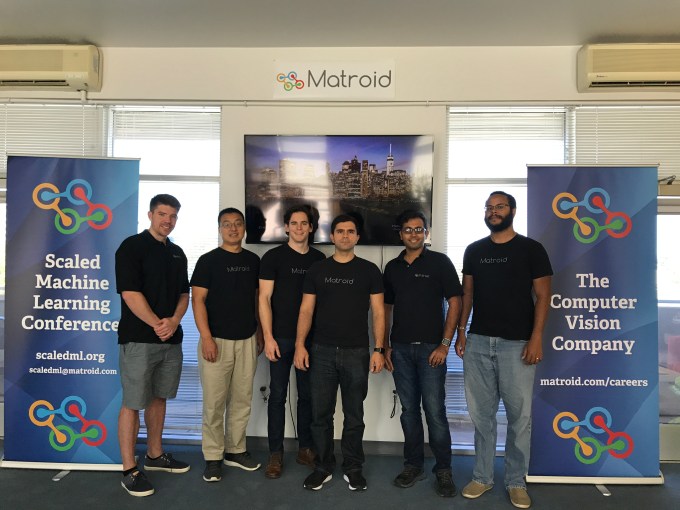Intel Capital
Auto Added by WPeMatico
Auto Added by WPeMatico
A wave of security startups have built solutions for enterprises that are meeting the challenges of “consumerization”, where IT organizations are tasked with securing a range of devices and apps — some brought in by employees, not issued by IT — that are on the organization’s networks. Today, a startup based out of Israel that is taking a similar approach, but aimed at consumers and the plethora of devices now connected to their home networks, is announcing a round of funding. SAM — which provides a system administered by way of a home or small office/home office internet router to monitor connected devices for suspicious activity — has raised a $12 million in funding.
The Series A includes interesting strategic investors. Led by Intel Capital, the round also includes participation from home security giant ADT, NightDragon (a cybersecurity-focused VC founded by Dave DeWalt, the former CEO of FireEye and McAfee) and Blumberg Capital.
Intel is already integrating SAM’s tech into its hardware, and ADT is evaluating how it can do so right now, said Sivan Rauscher, the CEO who first cut her teeth working on cybersecurity in the Israeli army before co-founding SAM with CTO Eilon Lotem and Vice Chairman Shmuel Chafets.
Prior to this round, SAM first emerged from stealth in February 2018 with $4 million from backers that included Team8, the well-supported VC-company incubator, whose co-founders Nadav Zafir, Israel Grimberg, and Liran Grinberg now also serve as advisors to the startup.
One of the reasons for following that up relatively quickly with more funding is because SAM has already signed some deals and it’s making its way into the market. Rauscher said that the first services using the startup’s tech will go live in Germany, Belgium and UK soon. (She declined to name the telcos that will roll it out, since “they want to keep the element of surprise,” she said.) It’s also already deployed across some 4 million devices by way of Israeli carrier Bezeq.
The company is notable because in the world of cybersecurity, many of the most talented people and companies are focused on targeting the enterprise market. In a way, that is not a surprise, since these typically are larger and more complex networks, and a larger amount of data is more immediately at stake.
(And you could argue that in fact this is also an enterprise play, since SAM is working with telcos to provide services to consumers: “We have an agenda to protect the end user but also the carrier as well,” Rauscher said.)
SAM is coming into the market at a key time.
Home networks are increasingly including a range of devices — not just phones, laptops and tablets; but set-top boxes, home security systems, lighting and fire detection, home ‘hubs’, connected appliances and more. Gartner estimates more than 7 billion connected devices in the consumer market for this year, with that number rising to 12.9 billion by 2020.
But perhaps an even bigger urgency is that home routers — which Rauscher describes as “low-hanging fruit” — have increasingly become a target for malicious hackers. A report from Akamai earlier this year estimated that 65,000 home routers have been accessed by hackers; the US and UK governments have further issued warnings that Russian hackers are lying in wait, using compromised routers to lay out long-term cyber warfare operations.
In that context, while the concept of securing a home router might not sound like as lucrative a target on its own compared to multi-million-dollar enterprise contracts (and the billions of dollars and thousands of data points that are at stake), the wider problem is clearly one that is ripe for addressing.
In a nutshell, Rauscher — also, I should add, notable for being one of a handful of female founders in the world of cybersecurity — says that what SAM does is operate by way of the router, but by identifying and providing security wrappers for every device that connects with the router.
“Our software is agnostic to any home router,” she said, adding that once you secure the router, “you secure everything in the network.” The essence of what SAM does is search out suspicious links into and coming out of these devices, and when it detects them, they are blocked, essentially taking the role of an IT department or presenting an enterprise-style deployment designed to work in the home.
“We were impressed with SAM’s technology and level of security for the home network, which is a critical part of building out the future of 5G,” said Dave Flanagan, vice president of Intel Corp. and group managing director of Intel Capital. “Unlike existing solutions, which necessitate buying a new gateway or replacing it with a secure gateway, SAM’s solution provides end-users security, without them needing to do anything. And for telecommunications companies and ISPs, its AI and machine learning capabilities monitor behavior on the network to detect unusual activity and prevent attacks. With the global market for smart home technology predicted to hit $100 billion by 2020, Intel and its partners know security is essential.”
Powered by WPeMatico
National Grid, the Northeast’s natural gas and electricity company, is planting a flag in Silicon Valley with the launch of National Grid Partners.
Led by former Intel Capital vice president and managing director Lisa Lambert, NGP has $250 million to invest in growth-stage technology startups over the next two to three years. Based in Las Gatos, NGP plans to fund 10 to 15 startups per year.
“We want to disrupt ourselves before we are disrupted,” Lambert told TechCrunch. “That’s the only way to protect yourself in a world where really nobody is safe.”
Deal size will vary, according to Lambert. NGP plans to back cleantech companies across sectors such as artificial intelligence, smart assets, enterprise SaaS, security and blockchain.
The purpose of the in-house venture fund is to bring a much-needed infusion of innovation into the utility industry.
“You can’t be satisfied with the status quo,” Lambert added. “If the telecom sector could do it all over again when mobile broke out — I think they would have done it differently. We don’t want to be in the same situation where we are resting on the strength of our asset profile or the fact that we are regulated; other industries had that same profile, it was hard for startups to break in and still, they got disrupted — massively disrupted.”
NGP has deployed capital to five startups so far, including big data analytics startup AutoGrid, which aims to help with predictive maintenance and commercial industrial demand response in the U.S.; weather forecasting startup ClimaCell; distributed energy resources marketplace Leap; Omnidian, a provider of protection plans for investments in residential and commercial solar energy systems; and Sitetracker, a SaaS platform focused on utilities and telecom.
The fund will also support early-stage startups looking for product-market fit and will mentor and train aspiring investors through a venture fellows program.
Powered by WPeMatico
Gamalon wants to change the game when it comes to understanding text-based customer communications. Instead of using neural networks to learn about a vast corpus of information, the startup takes a different approach, putting the text in a database and building decision trees to very rapidly train the data to arrive at the required information. Today, it announced a $20 million Series A investment led by Intel Capital.
Other participants in the round included .406 Ventures and Omidyar Technology Ventures along with existing investors Boston Seed Capital, Felicis Ventures and Rivas Capital. Today’s investment brings the total raised by the company since inception in 2013 to $32 million including backing from DARPA in earlier rounds.
Gamalon CEO Ben Vigoda says they developed a new approach to analyzing customer interactions because the state of the art in AI and machine learning was too much of a black box.
His company wants to change that by making the whole process much more interactive. To that end Gamalon also released a new tool called Idea Studio, a product that can automatically build learning trees to help users arrive at answers extremely fast or allow a business analyst or data scientists to simply enter a series of queries and build a decision tree on the fly based on the text. With neural networks, Vigoda says, the user has no control over the end result, but with Idea Studio you can edit the trees and refine the results immediately.

Gamalon Idea Studio decision tree. Photo: Gamalon
The product still needs a way to review all of the text-based content, of course, but instead of having humans categorize it all manually, with Gamalon you import your data into a database, do analytics on it and then make it available for rapid categorization and response.
This could have multiple utilities, whether for customer service agents to find answers very quickly or customers to interact with bots and find answers much faster. Analysts could use it to locate answers to business issues, and it’s sophisticated enough for data scientists to build machine learning projects based on a large corpus of data.

You can build a learning tree by entering related text to train it. GIF: Gamalon
Naveen Rao, corporate vice president and general manager in the Artificial Intelligence Products Group at Intel Corporation says they like how Gamalon puts machine learning into hands of many different employees around the customer information use case. “We want enterprises of all levels of AI capability to take full advantage of this growing volume and complexity of data. Gamalon’s unique approach can help users better understand billions of customer communications, customize individual responses, and take action to better serve those customers,” Rao explained in a statement.
The company is based in Cambridge, MA and has 23 employees. They have six large customers including Avaya.
Powered by WPeMatico
Intel Capital, the investment arm of the computer processor giant, is today announcing $72 million in funding for the 12 newest startups to enter its portfolio, bringing the total invested so far this year to $115 million. Announced at the company’s global summit currently underway in southern California, investments in this latest tranche cover artificial intelligence, Internet of Things, cloud services, and silicon. A detailed list is below.
Other notable news from the event included a new deal between the NBA and Intel Capital to work on more collaborations in delivering sports content, an area where Intel has already been working for years; and the news that Intel has now invested $125 million in startups headed by minorities, women and other under-represented groups as part of its Diversity Initiative. The mark was reached 2.5 years ahead of schedule, it said.
The range of categories of the startups that Intel is investing in is a mark of how the company continues to back ideas that it views as central to its future business — and specifically where it hopes its processors will play a central role, such as AI, IoT and cloud. Investing in silicon startups, meanwhile, is a sign of how Intel is also focusing on businesses that are working in an area that’s close to the company’s own DNA.
It’s hasn’t been a completely smooth road. Intel became a huge presence in the world of IT and early rise of desktop and laptop computers many years ago with its advances in PC processors, but its fortunes changed with the shift to mobile, which saw the emergence of a new wave of chip companies and designs for smaller and faster devices. Mobile is area that Intel itself acknowledged it largely missed out.
Later years have seen still other issues hit the company. For example, the Spectre security flaw (fixes for which are still being rolled out). And some of the business lines where Intel was hoping to make a mark have not panned out as it hoped they would. Just last month, Intel shut down development of its Vaunt smart glasses and reportedly the entirety of its new devices group.
The investments that Intel Capital makes, in contrast, are a fresher and more optimistic aspect of the company’s operations: they represent hopes and possibilities that still have everything to play for. And given that, on balance, things like AI and cloud services still have a long way to go before being truly ubiquitous, there remains a lot of opportunity for Intel.
“These innovative companies reflect Intel’s strategic focus as a data leader,” said Wendell Brooks, Intel senior vice president and president of Intel Capital, in a statement. “They’re helping shape the future of artificial intelligence, the future of the cloud and the Internet of Things, and the future of silicon. These are critical areas of technology as the world becomes increasingly connected and smart.”
Intel Capital since 1991 has put $12.3 billion into 1,530 companies covering everything from autonomous driving to virtual reality and e-commerce and says that more than 660 of these startups have gone public or been acquired. Intel has organised its investment announcements thematically before: last October, it announced $60 million in 15 big data startups.
Here’s a rundown of the investments getting announced today. Unless otherwise noted, the startups are based around Silicon Valley:
Avaamo is a deep learning startup that builds conversational interfaces based on neural networks to address problems in enterprises — part of the wave of startups that are focusing on non-consumer conversational AI solutions.
Fictiv has built a “virtual manufacturing platform” to design, develop and deliver physical products, linking companies that want to build products with manufacturers who can help them. This is a problem that has foxed many a startup (notable failures have included Factorli out of Las Vegas), and it will be interesting to see if newer advances will make the challenges here surmoutable.
Gamalon from Cambridge, MA, says it has built a machine learning platform to “teaches computers actual ideas.” Its so-called Idea Learning technology is able to order free-form data like chat transcripts and surveys into something that a computer can read, making the data more actionable. More from Ron here.
Reconova out of Xiamen, China is focusing on problems in visual perception in areas like retail, smart home and intelligent security.
Syntiant is an Irvine, CA-based AI semiconductor company that is working on ways of placing neural decision making on chips themselves to speed up processing and reduce battery consumption — a key challenge as computing devices move more information to the cloud and keep getting smaller. Target devices include mobile phones, wearable devices, smart sensors and drones.
Alauda out of China is a container-based cloud services provider focusing on enterprise platform-as-a-service solutions. “Alauda serves organizations undergoing digital transformation across a number of industries, including financial services, manufacturing, aviation, energy and automotive,” Intel said.
CloudGenix is a software-defined wide-area network startup, addressing an important area as more businesses take their networks and data into the cloud and look for cost savings. Intel says its customers use its broadband solutions to run unified communications and data center applications to remote offices, cutting costs by 70 percent and seeing big speed and reliability improvements.
Espressif Systems, also based in China, is a fabless semiconductor company, with its system-on-a-chip focused on IoT solutions.
VenueNext is a “smart venue” platform to deliver various services to visitors’ smartphones, providing analytics and more to the facility providing the services. Hospitals, sports stadiums and others are among its customers.
Lyncean Technologies is nearly 18 years old (founded in 2001) and has been working on something called Compact Light Source (CLS), which Intel describes as a miniature synchrotron X-ray source, which can be used for either extremely detailed large X-rays or very microscopic ones. This has both medical and security applications, making it a very timely business.
Movellus “develops semiconductor technologies that enable digital tools to automatically create and implement functionality previously achievable only with custom analog design.” Its main focus is creating more efficient approaches to designing analog circuits for systems on chips, needed for AI and other applications.
SiFive makes “market-ready processor core IP based on the RISC-V instruction set architecture,” founded by the inventors of RISC-V and led by a team of industry veterans.
Powered by WPeMatico
 Companies like New Relic and AppDynamics have been offering applications performance management solutions to help operations teams track external performance issues for years. Nyansa (pronounced ‘knee-ans-sah’) is bringing that kind of performance management to internal networks. Today, the company announced a $15 million Series B investment. The round was led by Intel Capital… Read More
Companies like New Relic and AppDynamics have been offering applications performance management solutions to help operations teams track external performance issues for years. Nyansa (pronounced ‘knee-ans-sah’) is bringing that kind of performance management to internal networks. Today, the company announced a $15 million Series B investment. The round was led by Intel Capital… Read More
Powered by WPeMatico
 The retail industry is one that’s rife for disruption by technology. Under intense pressure from giants like Amazon and Walmart, retailers are often stuck using legacy systems and are ill-equipped to compete using the latest tools. Rubikloud announced a $37 million investment today to help retailers attack the modernization problem with cloud tools built with artificial intelligence… Read More
The retail industry is one that’s rife for disruption by technology. Under intense pressure from giants like Amazon and Walmart, retailers are often stuck using legacy systems and are ill-equipped to compete using the latest tools. Rubikloud announced a $37 million investment today to help retailers attack the modernization problem with cloud tools built with artificial intelligence… Read More
Powered by WPeMatico
 As computer vision and object recognition technology continue to mature, we’re edging closer to automating away the exceedingly boring task of monitoring closed circuit TV cameras. Matroid is one of the startups leading the democratization of this variety of machine intelligence. The company is announcing a $10 million Series A this morning from NEA and Intel Capital that brings… Read More
As computer vision and object recognition technology continue to mature, we’re edging closer to automating away the exceedingly boring task of monitoring closed circuit TV cameras. Matroid is one of the startups leading the democratization of this variety of machine intelligence. The company is announcing a $10 million Series A this morning from NEA and Intel Capital that brings… Read More
Powered by WPeMatico
 Sigfox, the IoT company based out of France that is building a dedicated, global network to connect, monitor and control devices like smart-home alarms, machinery, refrigerators and city streetlights, today confirmed that it has closed its latest round of funding, a Series E round of €150 million ($160 million). We broke the news of this round in October, noting it was likely to be… Read More
Sigfox, the IoT company based out of France that is building a dedicated, global network to connect, monitor and control devices like smart-home alarms, machinery, refrigerators and city streetlights, today confirmed that it has closed its latest round of funding, a Series E round of €150 million ($160 million). We broke the news of this round in October, noting it was likely to be… Read More
Powered by WPeMatico
 Some more big news for the world of open source. MariaDB Corporation — the startup formerly known as SkySQL and building for-profit solutions on the SQL fork managed by the MariaDB foundation — has raised another $9 million in funding and announced a new CEO, Michael Howard, a veteran executive from the enterprise world. The funding brings the total raised by MariaDB to just over… Read More
Some more big news for the world of open source. MariaDB Corporation — the startup formerly known as SkySQL and building for-profit solutions on the SQL fork managed by the MariaDB foundation — has raised another $9 million in funding and announced a new CEO, Michael Howard, a veteran executive from the enterprise world. The funding brings the total raised by MariaDB to just over… Read More
Powered by WPeMatico
 It has often been said that every company is a software company or even a big data company, but as I attended the Intel Capital Global Summit last week, another thought occurred to me: every company is now also an investment company. The star of the show last week was Intel Capital of course, the venture arm of Intel Corporation, but it’s far from alone. Over dinner strictly by… Read More
It has often been said that every company is a software company or even a big data company, but as I attended the Intel Capital Global Summit last week, another thought occurred to me: every company is now also an investment company. The star of the show last week was Intel Capital of course, the venture arm of Intel Corporation, but it’s far from alone. Over dinner strictly by… Read More
Powered by WPeMatico